Corruption In Pakistan
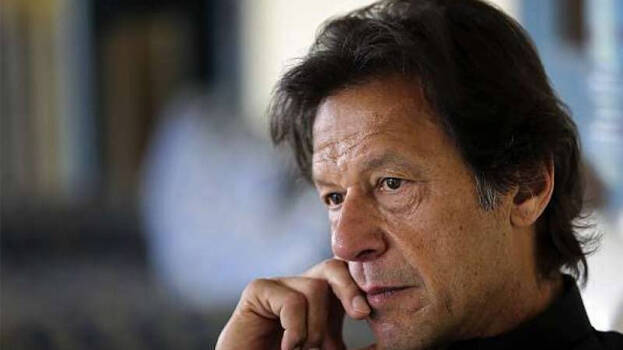
Pakistan dropped 16 places in the Corruption Perceptions Index (CPI) for 2021 compared to the previous year, ranking 140 out of 180 countries, Transparency International said in a report on Tuesday.
The CPI, which measures how corrupt a country’s public sector is perceived to be by its experts and businesspeople, uses a scale of zero to 100 where zero is highly corrupt and 100 is very clean.
The 2021 edition of the CPI ranked 180 countries and territories by their perceived levels of public sector corruption, drawing on 13 expert assessments and surveys of business executives.
In 2020, Pakistan’s CPI was 31 and it was ranked 124 out of 180 countries. According to Transparency International, the country’s corruption score has now deteriorated to 28 while it is ranked 140 out of the total countries on the index.
In contrast, India’s corruption score stood at 40 while Bangladesh’s CPI was 26. The two countries ranked 85 and 147, respectively.
While the corruption levels remain at a standstill worldwide, with 86 per cent of the countries making little to no progress in the last 10 years, Transparency International in its Index revealed that the absence of “rule of law” and “state capture” has resulted in substantial low CPI score of Pakistan.
Vice Chair of Transparency International Pakistan, Justice (retd) Nasira Iqbal, while commenting on the report said that there was no change in CPI 2021 scores of India and Bangladesh from last year.
Under the PTI government, the ranking of Pakistan has gradually slid. In 2019, it was 120 out of 180 countries, in 2020, it was 124 and in 2021 it worsened further to 140. In 2018, during the PML-N government, the ranking was 117 out of 180 countries.
In its report, Transparency International found countries that violate civil liberties consistently score lower on the CPI. Complacency in fighting corruption exacerbates human rights abuses and undermines democracy, setting off a vicious spiral. As these rights and freedoms erode and democracy declines, authoritarianism takes its place, contributing to even higher levels of corruption.
According to Transparency International, the top-performing countries were Denmark, Finland and New Zealand — all having a corruption perceptions score of 88 — followed by Norway, Singapore and Sweden, all of them scoring 85.
In contrast, the worst-performing countries were South Sudan with a corruption perceptions score of 11, followed by Syria (13), Somalia (13, Venezuela (14) and Afghanistan (16).
Regional situation
In its report, Transparency International noted a trend in countries with weak scores — China, Indonesia, Bangladesh and Pakistan — of “weakening of anti-corruption institutions or in some cases absence of an agency to coordinate action against corruption”.
“Civil society organisations that speak up against the government have been targeted with security, defamation, sedition, hate speech and contempt-of-court charges, and with regulations on foreign funding,” the report said.
It further said that countries like Singapore, Bangladesh and Pakistan had increased digital surveillance to silence those trying to hold governments accountable during the pandemic.
Commenting on the findings, chair of Transparency International, Delia Ferreira Rubio, said: “Human rights are not simply a nice-to-have in the fight against corruption. Authoritarian approaches destroy independent checks and balances and make anti-corruption efforts dependent on the whims of an elite.
“Ensuring people can speak freely and work collectively to hold power to account is the only sustainable route to a corruption-free society.”
‘Charge sheet against govt’
Meanwhile, reacting to the report, PML-N President Shehbaz Sharif said corruption had “decreased” during the PML-N’s government as a result of “transparency, good governance and legal reforms”.
However, “now corruption has hit an all-time high despite the fact that no worthwhile development has taken place,” he tweeted.
tweeted.
PPP Vice President Sherry Rehman termed the report a “charge sheet against the [PTI] government”, saying the rankings had “exposed the government’s narrative”.
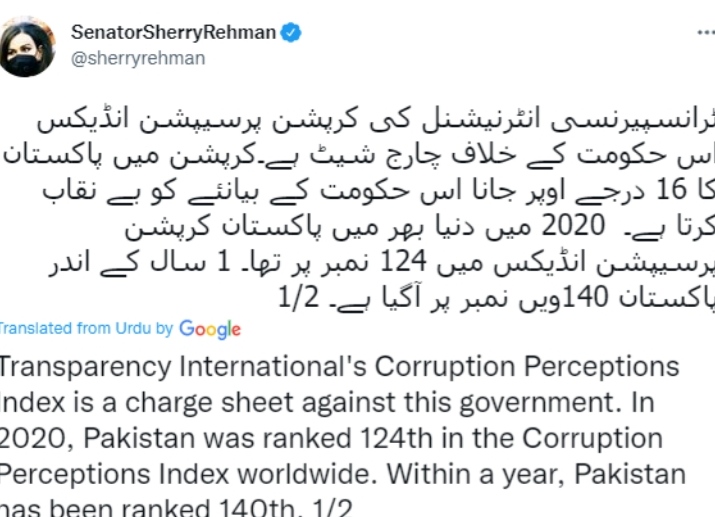
The government that claimed to end corruption has moved above 16 countries in graft, she said in a separate tweet. Rehman noted that the prime minister’s adviser on accountability Mirza Shahzad Akbar had resigned recently, saying it was “proof” that corruption had increased instead of decreasing.
Accountability is only for targeting opponents. International institutions are now uncovering the corruption of this government, she added.
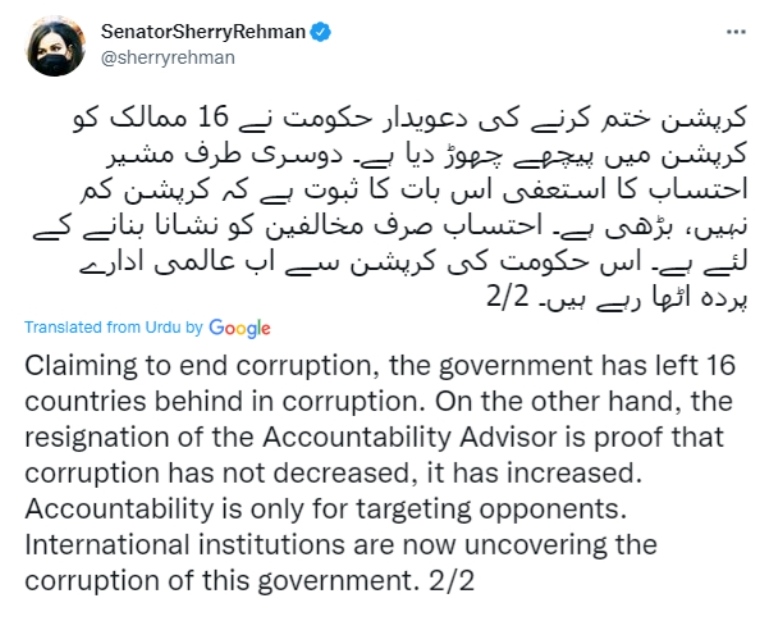
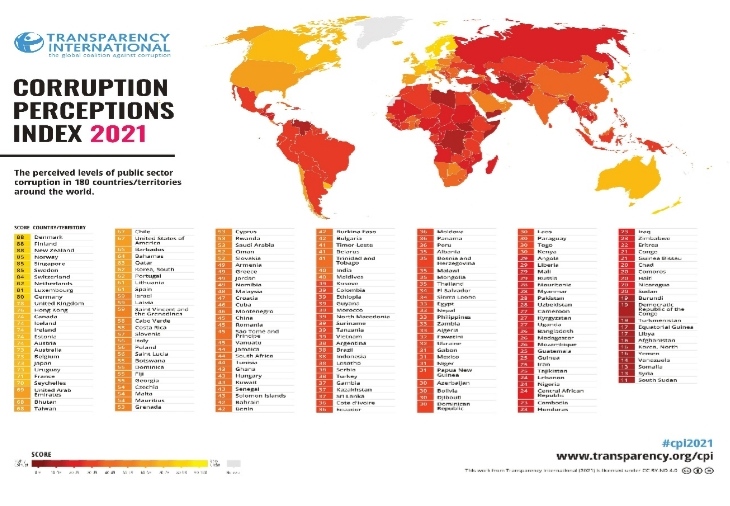
Regional situation
In its report, Transparency International noted a trend in countries with weak scores — China, India, Indonesia, Bangladesh and Pakistan — of “weakening of anti-corruption institutions or in some cases absence of an agency to coordinate action against corruption”.
The report termed the situation in India “particularly worrying”, saying there were concerns about its democratic status as fundamental freedoms and institutional checks and balances decay. Journalists and activists in the country are especially at risk, it noted, adding that they had been victims of attacks by the police, political militants, criminal gangs and corrupt local officials.
“Civil society organisations that speak up against the government have been targeted with security, defamation, sedition, hate speech and contempt-of-court charges, and with regulations on foreign funding,” the report said.
It further said that countries like Singapore, Bangladesh and Pakistan had increased digital surveillance to silence those trying to hold governments accountable during the pandemic.
Commenting on the findings, chair of Transparency International, Delia Ferreira Rubio, said: “Human rights are not simply a nice-to-have in the fight against corruption. Authoritarian approaches destroy independent checks and balances and make anti-corruption efforts dependent on the whims of an elite.
“Ensuring people can speak freely and work collectively to hold power to account is the only sustainable route to a corruption-free society.”
‘Charge sheet against govt’
Meanwhile, reacting to the report, PML-N President Shehbaz Sharif said corruption had “decreased” during the PML-N’s government as a result of “transparency, good governance and legal reforms”.
However, “now corruption has hit an all-time high despite the fact that no worthwhile development has taken place,” he tweeted.
PPP Vice President Sherry Rehman termed the report a “charge sheet against the [PTI] government”, saying the rankings had “exposed the government’s narrative”.
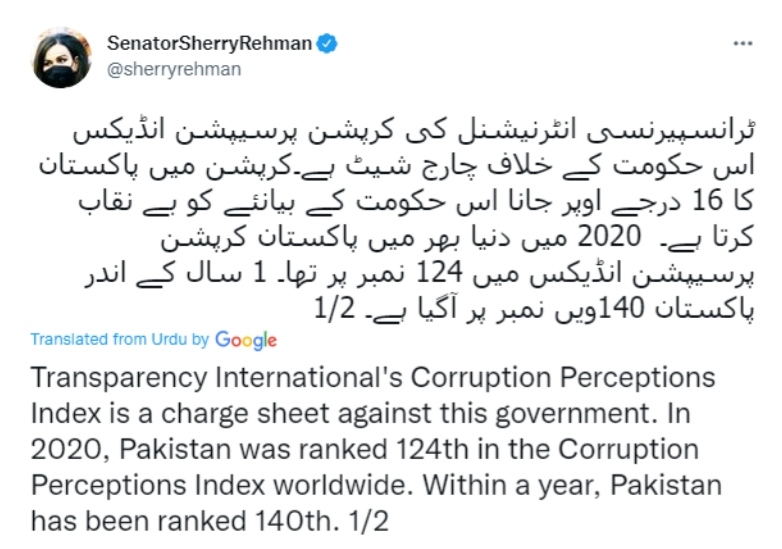
The government that claimed to end corruption has moved above 16 countries in graft, she said in a separate tweet. Rehman noted that the prime minister’s adviser on accountability Mirza Shahzad Akbar had resigned recently, saying it was “proof” that corruption had increased instead of decreasing.
Accountability is only for targeting opponents. International institutions are now uncovering the corruption of this government, she added.




